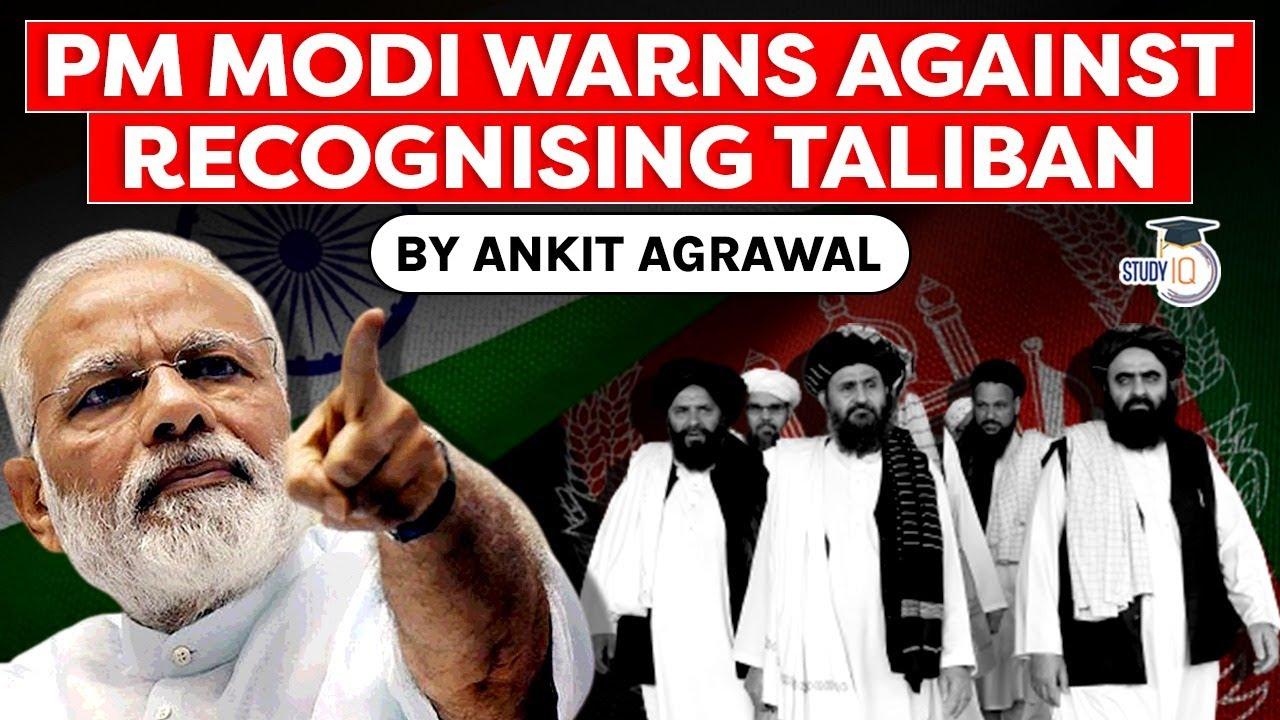Table of Contents
What has happened?
- For the first time since the fall of Kabul to the Taliban,Prime Minister Narendra Modi raised questions Friday on the “acceptability” of the new “system” in Afghanistan and Flagged concerns that the change of power there took place without negotiations, and was not inclusive.
At the SCO meeting
- In his virtual address to a joint meeting of the Shanghai Cooperation Organisation (SCO) and Russia-led Collective Security Treaty Organization (CSTO) that was convened in Dushanbe to discuss the situation in Afghanistan,
- Modi said the international community must ensure Afghan soil is not used to spread terrorism.

- SCO is seen as a counterweight to NATO, is an eight-member economic and security bloc.
- It has emerged as one of the largest transregional international organisations.
- India and Pakistan became its permanent members in 2017.
- Prime Minister Modi has led the Indian delegation at the annual SCO summit since India became a full member in 2017.
- However, India’s association with the organisation dates back to 2005 when it became an Observer State of the grouping.
- Since then, India has played a positive and constructive role in all areas of SCO activities with a special emphasis on cooperation in trade and economy.
4 issues
- Modi listed four issues that he said should be the focus of regional cooperation on Afghanistan.
- The new system put in place in Kabul,
- The spread of terrorist and extremist ideologies if instability continues in Afghanistan,
- The possibility of the uncontrolled flow of drugs,
- Illegal weapons and human trafficking, and the serious humanitarian crisis in the war-torn country.
- “The first issue is that the change of power in Afghanistan is not inclusive, and has taken place without negotiation. This raises questions about the acceptability of the new system,” Modi told the SCO.
- “Representation of all sections of Afghan society, including women and minorities, is also important.
- And therefore, it is essential that the global community decides on the recognition of the new system in a thoughtful and collective manner. India supports the central role of the UN on this issue,” he said.
- “Second, if instability and fundamentalism continue in Afghanistan, it will lead to terrorist and extremist ideologies all over the world.
- Other extremist groups may also be encouraged to seek power through violence. We all countries have been victims of terrorism in the past.
- So together we must ensure that the soil of Afghanistan is not used to spread terrorism in any country.
- SCO member countries should develop strict and common norms on this issue. Going forward, these norms can also become a template for global anti-terror cooperation,” he said.
- “Third, developments in Afghanistan…could lead to an uncontrolled flow of drugs, illegal weapons, and human trafficking.
- A large amount of advanced weapons remain in Afghanistan. Due to these, there will be a risk of instability in the entire region.
- The RATS (regional anti-terrorist structure) mechanism in SCO can play a positive role in monitoring these flows and enhancing information sharing.
- From this month, India is presiding over the council of this institution and has some concrete proposals in this regard,” he said.

- The fourth concern, Modi said, is the humanitarian situation in Afghanistan, where India is ready to help and be part of any regional or global initiative to help Afghan society.
Dushanbe declaration
- The Dushanbe Declaration, on which all countries including India, Pakistan, and China signed off, said SCO member-countries expressed their “support for Afghanistan as an independent, neutral, united, democratic and peaceful State, free of terrorism, war and drugs”.
- “Member States believe that it is critical to have an inclusive Government in Afghanistan, with representatives from all ethnic, religious and political groups of Afghan society,” the declaration said.
significance
- The rise to the power of the Taliban in Afghanistan is a major setback for India.
- But to Pakistan, it is a strategic win, while China has built a relationship with the militant group.
- Bejing’s engagement with the Taliban is seen as the reason why Al Qaeda’s avoided mentioning Xinjiang while calling for “liberation” of other “Muslim lands”, including Kashmir.
Q) Which of the following country was not the founding member of the SCO?
- China
- Kazakhstan
- Uzbekistan
- Russia
Latest Burning Issues | Free PDF























 WhatsApp
WhatsApp